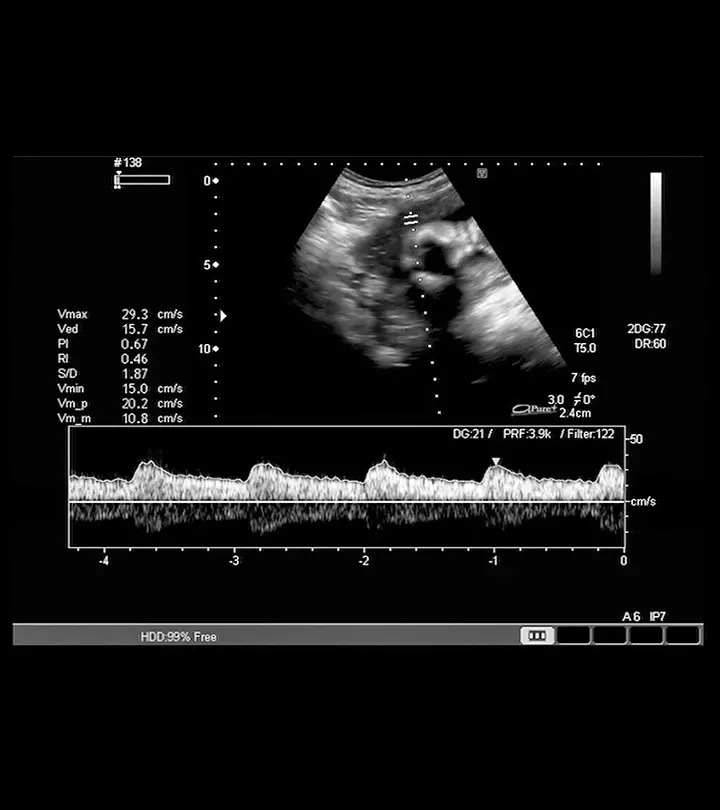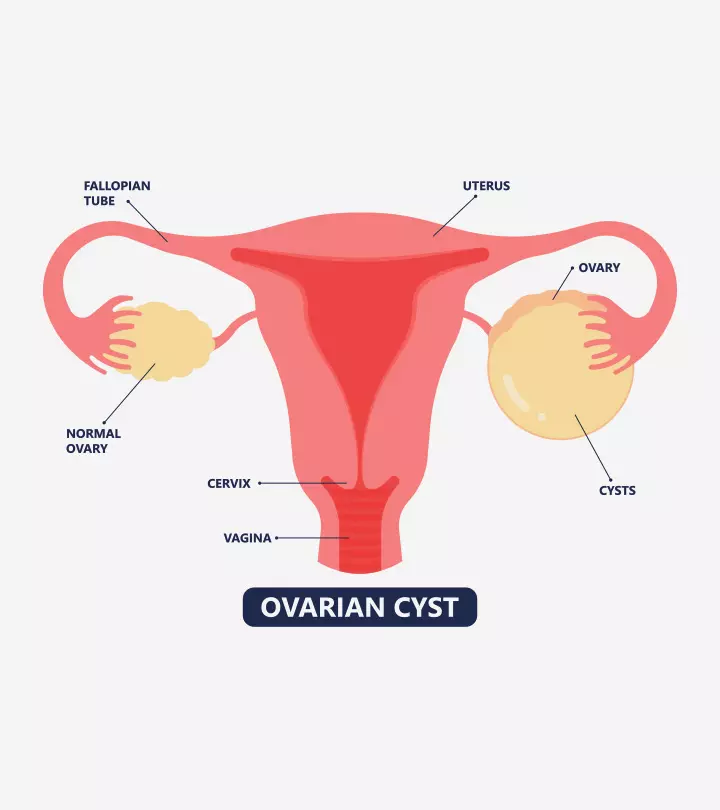
Image: iStock
Your obstetrician may often prescribe Doxinate during pregnancy to provide symptomatic relief from severe nausea and vomiting.
Morning sickness, also known as nausea and vomiting of pregnancy (NVP), is one of the most common pregnancy symptoms caused by hormonal changes in your body. It can range from mild to severe and can happen at any time of day or night, despite its name.
This post discusses the significance of doxinate tablet uses in pregnancy, their dosing, and possible side effects.
Key Pointers
- Recommended dosages of Doxinate are safe for treating nausea and vomiting during pregnancy.
- It may cause side effects such as dizziness, dry mouth, drowsiness, headache, and hypersensitivity.
- For optimal effects, take Doxinate on an empty stomach.
- It is not known to have any adverse effects on fetal health.
What Is Doxinate?

Doxinate (Doxinate G) is a medicine used to treat nausea and vomiting during pregnancy. It is a combination of doxylamine succinate (antihistamine/antiemetic) and pyridoxine hydrochloride (vitamin B6). This medicine is available in the form of capsules and tablets.
The Doxinate OD tablets and Doxinate plus tablets (with the composition doxylamine, vitamin B6/pyridoxine, and folic acid) are prescribed to prevent morning sickness from worsening to hyperemesis gravidarum, which is severe nausea resulting in weight loss and dehydration.
Is Doxinate Safe For Pregnant Women?
Doxinate falls under the pregnancy drug category A (1), which is safe to administer during all the trimesters of pregnancy. The recommended dose of Doxinate should be taken for two to three days to get an optimal result.
 Did you know?
Did you know?How To Take Doxinate During Pregnancy?

The recommended dose of doxinate in pregnancy is two tablets a day initially, at bedtime. If the condition does not get under control, then the dosage is four tablets a day – one in the morning, one in the afternoon, and two at bedtime for optimum efficacy. It is crucial to adhere to the regimen to ensure both safety and effectiveness, as exceeding the recommended dosage can lead to adverse effects. If you feel uneasy even after taking the drug, then consult an obstetrics and gynecology specialist.
When Should You Start And Stop Using Doxinate During Pregnancy?

Usually, morning sickness starts between the 4th and 9th week of pregnancy, and peaks between the 7th and 12th week (2). If the condition is severe, you can take Doxinate early on, as prescribed by the doctor. However, ensure that you complete the entire course of the medicine and do not stop taking it without consulting your doctor.
Depending on your maternal health and the progression of pregnancy, the doctor will provide you with the required medical advice to ensure safe and effective drug usage.
If you need to stop the medication, the doctor will gradually decrease the dosage to prevent relapse of morning sickness.
What Are The Side Effects of Doxinate?

The side effects of Doxinate are usually minimal. They include (1):
- Dizziness
- Drowsiness and fatigue
- Dry mouth
- A headache
- Hypersensitivity
- Constipation
In case of any pre-existing health conditions such as asthma, bronchitis, glaucoma, or impairment of the airways in the lungs, this drug should be used with extreme caution.
Does Doxinate Have Any Effect On The Fetus?
No studies have shown that Doxinate has any negative impact on fetal development or that it causes any congenital abnormalities.
Can Doxinate Be Taken With Food?
Doxinate is taken on an empty stomach for optimal results. However, if taken with food, the time taken for the drug to act may get prolonged.
When Is Doxinate Forte Recommended During Pregnancy?

Doxinate Forte is recommended for nausea and vomiting associated with nutritional deficiencies. It is a combination of doxylamine (20mg), vitamin B6 (20mg), and folic acid (5mg).
 Quick tip
Quick tipIs It Safe To Take Doxinate While Breastfeeding?
There are no studies confirming that Doxinate can be used during breastfeeding. However, Doxinate during lactation is considered an off-label use. Doxylamine succinate, a component of Doxinate, is known for its sedative and anti-histamine properties and can enter the breast milk and affect the infant. Pyridoxine is another component of the drug, which is present in a very low dose and poses no risk to the infants.
Frequently Asked Questions
1. Can I take Doxinate with other medications during pregnancy?
Doxylamine, a component of Doxinate, may interact with other medications (3). Therefore, consult your healthcare provider before taking Doxinate with other medications during pregnancy to avoid any complications that may arise due to unguided drug use.
2. Can I take Doxinate if I have a history of allergies during pregnancy?
Yes, Doxinate comprises doxylamine succinate, a sedating antihistamine used alone as a short-term sedative or combined with other drugs for nighttime cold and allergy relief (3).
3. Can I take Doxinate if I have a history of liver or kidney problems during pregnancy?
Avoid taking Doxinate with a history of severe liver disease. Use it cautiously for kidney problems, as it is excreted in the urine. Before taking any medicine, especially during pregnancy, consult a healthcare professional and disclose your complete medical history for safety (3).
4. What are some alternative treatments for nausea and vomiting during pregnancy?
For moderate symptoms, doctors might suggest a combination of vitamin B6 and doxylamine, or other medications such as antihistamines (e.g., hydroxyzine), dopamine antagonists (e.g., metoclopramide), or serotonin antagonists (e.g., ondansetron). In severe cases, corticosteroids may be considered, though their effectiveness is not fully proven. Eating small meals throughout the day, taking ginger supplements, or using acupressure may also be helpful. Consult your healthcare provider before starting any treatment during pregnancy (4).
5. Is Doxinate addictive?
While there are some case reports suggesting that antihistamines, in general, could have addictive properties, there aren’t many studies that specifically suggest the risk of addiction to doxylamine succinate, the active ingredient in Doxinate(5).
Doxinate during pregnancy is prescribed to relieve symptoms of morning sickness. The condition is common in pregnant women and presents mainly nausea and vomiting. Your doctor may suggest Doxinate forte if you have nutrient deficiencies also. The medication is considered safe but should be taken under medical supervision to avoid dosing errors. It is extremely important to be aware of medications to avoid during pregnancy to ensure the safety of both you and your baby. Doxinate is usually taken on an empty stomach and may show headache or dry mouth as side effects. Make sure you inform your doctor about any pre-existing health issues before starting the medication.
Infographic: The Uses And Side Effects Of Doxinate
Doxinate contains a combination of doxylamine succinate (antihistamine/antiemetic) and vitamin B6. Some formulations may contain folic acid as well. The infographic below discusses the purpose of prescribing the medication during pregnancy and its possible side effects.

Illustration: Momjunction Design Team
Illustration: Is It Safe To Use Doxinate During Pregnancy?

Image: Stable Diffusion/MomJunction Design Team
References
- Nina Nuangchamnong and Jennifer Niebyl; (2014); Doxylamine succinate–pyridoxine hydrochloride (Diclegis) for the management of nausea and vomiting in pregnancy: an overview.
https://www.ncbi.nlm.nih.gov/pmc/articles/PMC3990370/ - Neda Ebrahimi et al.; (2010); Optimal management of nausea and vomiting of pregnancy.
https://www.ncbi.nlm.nih.gov/pmc/articles/PMC2990891/ - Doxinate Drug Information, Interactions and Dosage
https://www.doxinate.com/prescribing-info
Community Experiences
Join the conversation and become a part of our nurturing community! Share your stories, experiences, and insights to connect with fellow parents.
Read full bio of Dr. Monica Agarwal
Read full bio of shreeja pillai
Read full bio of Rebecca Malachi
Read full bio of Dr. Joyani Das
















